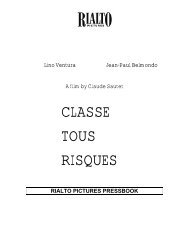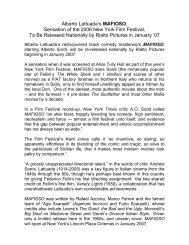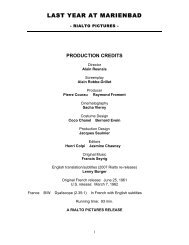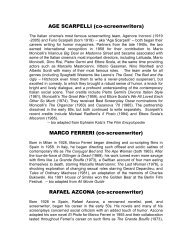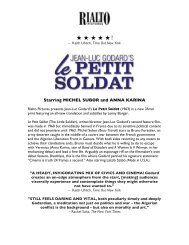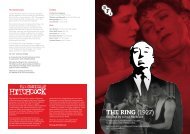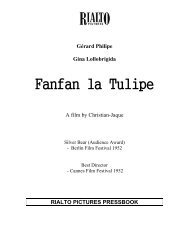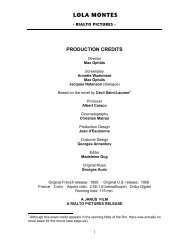download the Maculine Feminine Pressbook - Rialto Pictures
download the Maculine Feminine Pressbook - Rialto Pictures
download the Maculine Feminine Pressbook - Rialto Pictures
You also want an ePaper? Increase the reach of your titles
YUMPU automatically turns print PDFs into web optimized ePapers that Google loves.
of <strong>the</strong> Godard characters and like both directors, Léaud, Truffaut’s biographers<br />
explain, "doesn’t reject society; it is society that takes issue with his spirit and style<br />
of life." These men are all bound up in an energetic verve that is dulled by <strong>the</strong><br />
constraints of society. Childlike: Truffaut in emotions and romance, Godard in<br />
anger and ideals, and Léaud in body and spirit.<br />
Léaud won <strong>the</strong> Best Actor Award (Silver Bear) for his disarming performance in<br />
Masculine <strong>Feminine</strong>.<br />
Excerpted from Because of Tenderness: Thoughts on <strong>the</strong> Performance of<br />
Jean-Pierre Léaud by Rhys Graham (collected in Senses of Cinema)<br />
CHANTAL GOYA (Madeleine)<br />
Born Chantal Deguerre in Saigon in 1946, Goya moved to Paris when she was<br />
four. At <strong>the</strong> behest of Jean-Jacques Debout, Goya auditioned at RCA Records for<br />
legendary R&B guitarist Mickey Baker. The audition was a success, and, in 1964,<br />
Goya’s first single, C'est bien Bernard, propelled her into yé yé stardom 31 .<br />
In 1966, while filming Masculine <strong>Feminine</strong>, she became pregnant with Debout’s<br />
child, and <strong>the</strong> two married. The couple enjoyed an artistic partnership: Debout<br />
penned <strong>the</strong> majority of his wife’s songs until Goya's yé yé period ended in 1967.<br />
In <strong>the</strong> 1970s, Goya again became popular, this time for her work performing<br />
children's songs. The singer made a comeback in 1998 with <strong>the</strong> release of Les<br />
Années 60, an anthology of her 60’s hits. In 2001, Goya re-appeared in <strong>the</strong><br />
French Top 40 when her song Becassine Is My Cousine hit number 26 in <strong>the</strong><br />
charts. The song was also released in rap and techno-remix versions.<br />
The six Goya songs heard on <strong>the</strong> Masculine <strong>Feminine</strong> soundtrack (all written by<br />
husband Jean-Jacques Dubout) are “D’abord dis-moi ton nom,” “Laisse-moi,” “Si tu<br />
gagnes au flipper” (aka “Pinball Champ”), “Tu m’a trop menti,” “Comment le revoir”<br />
and “Sois gentil” (words by Roger Dumas). An album of <strong>the</strong> soundtrack songs was<br />
released in France and reissued on CD in Japan in 2004.<br />
WILLY KURANT (Cinematographer)<br />
A leading cinematographer of <strong>the</strong> French New Wave, Kurant began his feature film<br />
career as DP on Agnes Varda’s Les Créatures. He has shot films for Orson<br />
Welles, (The Immortal Story) Jerzy Skolimowski (Le Départ), Maurice Pialat (Sous<br />
le Soleil de Satan), among many o<strong>the</strong>rs. Following Masculine <strong>Feminine</strong>, he shot<br />
<strong>the</strong> Godard sequence of Far From Vietnam.<br />
31 see footnote 26<br />
18



